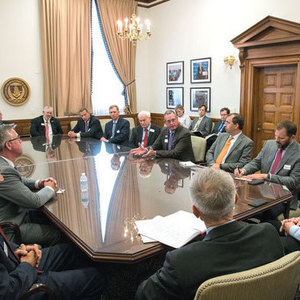RFS Growth Welcomed News, But Small Refinery Waivers Threaten Industry

August 23, 2018
BY The National Biodiesel Board
The National Biodiesel Board continues to leverage all available resources—expert consultants, biofuels allies and other industry partners—in the daily battle to enact policies in Washington, D.C., that will strengthen the industry and increase biodiesel production.
When the U.S. EPA proposed increases in the biomass-based diesel and advanced biofuel categories under the Renewable Fuel Standard in June, NBB expressed cautious optimism. NBB acknowledged that the proposed increases send a positive signal to the industry, but cautioned that EPA’s granting of dozens of retroactive small refinery hardship exemptions undercut prior year volumes and could still have a negative impact on future year standards.
“We welcome the administration’s proposal to grow the biodiesel volumes, following two flatlined years,” said Kurt Kovarik, vice president of federal affairs at NBB. “We’re pleased the EPA has acknowledged our ability to produce higher volumes, but instability in the RFS program caused by the EPA has done significant damage that can only be rectified for biodiesel through consistent and predictable growth in volumes.”
Kovarik explained that EPA’s decision to retroactively grant numerous waivers to petroleum refiners, releasing them from their obligations under the RFS, has effectively reduced obligations for biodiesel by more than 300 million gallons.
“As a candidate on the campaign trail, Donald Trump pledged he would support biofuels and protect the RFS,” Kovarik said. “While this is just a proposal, we hope the administration is serious about growing biodiesel volumes and will fulfill the president’s promise to support and grow the RFS.”
The EPA’s proposed renewable volume obligations (RVOs) for the biomass-based diesel category would increase from 2.1 billion gallons in 2019 to 2.43 billion gallons in 2020. The advanced biofuel category, for which biodiesel also qualifies, would increase slightly under the EPA’s proposal from 4.29 billion gallons in 2018 to 4.88 billion gallons in 2019.
The RFS, passed by a bipartisan Congress and signed into law by President George W. Bush, requires the EPA to gradually grow the volume of advanced biofuels like biodiesel delivered to consumers. Since taking office, President Trump’s EPA has recommended zero growth for the biomass-based diesel category.
Across the nation, biodiesel representatives are making their voices heard on the importance of the RFS. In June, more than 100 NBB members attended the association’s annual membership meeting and fly-in, visiting Capitol Hill to engage their members of Congress on the RFS and other key issues.
Advertisement
Advertisement
Earlier that month, Renewable Energy Group CEO Randy Howard, on behalf of NBB, testified before the House Energy & Commerce Subcommittee on Environment emphasizing that stable, predictable growth for biodiesel is key to the future success of the RFS. Biodiesel producers, advocates and agriculture leaders joined the effort with an open letter to President Trump, imploring that biodiesel not be ignored in the Trump administration’s efforts to navigate differences between petroleum refiners and the ethanol industry.
Furthermore, NBB joined a coalition of biofuel and agriculture groups in petitioning the EPA to change its regulations to account for lost volumes of renewable fuel resulting from the unprecedented number of retroactive small refinery exemptions from RFS obligations recently granted by EPA.
NBB’s wide-ranging efforts have had a positive effect in the nation’s capital, and biodiesel supporters will not let up as they push for federal policies to continue biodiesel’s growth across the country. On July 18, NBB and many of its members testified at an EPA hearing in Michigan on RFS standards for 2019 and the biomass-based diesel volume for 2020. In addition, NBB will submit formal comments on EPA’s proposed rule before the Aug. 17 deadline.
The August congressional recess is a great time to set up meetings or invite members of Congress or senators to tour biodiesel plants. Anyone interested in engaging in congressional outreach activities can contact NBB for support. These collective efforts continue to be critical to achieving the biodiesel industry’s policy goals.
Advertisement
Advertisement
Related Stories
Reps. Mike Flood, R-Neb., and Troy A. Carter, Sr., D-La., on July 21 reintroduced the SAF Information Act. The bill directs the U.S. EIA to more explicitly include SAF data in its weekly and monthly reports.
The U.S Department of Energy Bioenergy Technologies Office, in partnership with the Algae Foundation and NREL, on July 21 announced the grand champion and top four winning teams of the 2023 - 2025 U.S. DOE AlgaePrize Competition.
The European Commission on July 18 announced its investigation into biodiesel imports from China is now complete and did not confirm the existence of fraud. The commission will take action, however, to address some systemic weaknesses it identified.
On July 18, U.S. EPA announced a reduction in force (RIF) as the agency continues its comprehensive restructuring efforts. With organizational improvements, EPA is delivering $748.8 million in savings.
The U.S EPA on July 17 released data showing more than 1.9 billion RINs were generated under the RFS during June, down 11% when compared to the same month of last year. Total RIN generation for the first half of 2025 reached 11.17 billion.
Upcoming Events










